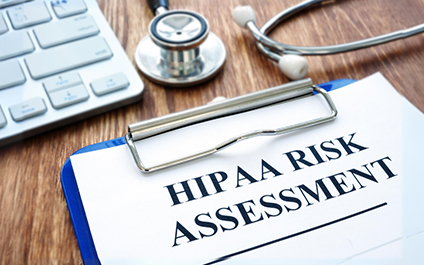
If you've worked in the medical field, you're likely familiar with the Health Insurance Portability and Accountability Act (HIPAA) and its role in protecting sensitive healthcare data. Despite HIPAA's critical importance, a common misconception persists among providers: that passing a risk assessment equates to comprehensive HIPAA compliance and cybersecurity. This belief can create a false sense of security and overlook the continuous efforts required to truly safeguard patient information. This article aims to clarify the role of risk assessments within HIPAA compliance and illustrate how Managed Services Providers (MSPs) are crucial in enhancing cybersecurity measures and compliance efforts, ensuring the protection of sensitive data against evolving cyberthreats.
The Role and Limitations of Risk Assessments
Understanding the function and scope of risk assessments is crucial for any entity handling sensitive health information. A risk assessment, at its core, is a comprehensive evaluation aimed at identifying vulnerabilities, threats and risks to an organization's data and systems, particularly those that store, process or transmit protected health information (PHI).
How Risk Assessments are Conducted
Risk assessments in the healthcare sector are conducted through a series of steps designed to systematically identify and analyze potential threats to PHI. This process involves:
Inventorying assets:
Identify all systems, devices and applications where PHI is stored, processed or transmitted.
Identifying threats and vulnerabilities
Pinpoint potential threats (e.g., hackers, natural disasters) and vulnerabilities (e.g., weak passwords, outdated software) that could lead to unauthorized access or disclosure of PHI.
Assessing current security measures
Evaluate the effectiveness of existing security protocols and measures to protect against identified threats and vulnerabilities.
Determining the potential impact and likelihood
Assess the potential impact of identified risks on the confidentiality, integrity and availability of PHI, and estimate the likelihood of such events occurring.
Prioritizing risks
Rank identified risks based on their potential impact and likelihood to help focus efforts on the most critical vulnerabilities.
The Limitations of Risk Assessments
While risk assessments are integral to maintaining HIPAA compliance and enhancing cybersecurity, passing a risk assessment does not equate to an impenetrable defense against all forms of cyberthreats or full compliance with HIPAA regulations. Several reasons underpin this limitation:
Dynamic Nature of Threats
Cyberthreats are continually evolving, with new types of attacks emerging regularly. A risk assessment provides a snapshot based on the threat landscape at the time of the assessment, which can quickly become outdated.
Potential Gaps
Risk assessments may not cover all possible scenarios or emerging threats, especially if not conducted regularly or thoroughly. New technologies, changes in healthcare practices or evolving regulatory requirements can introduce new vulnerabilities not previously considered.
Human Factor
Even the most comprehensive risk assessment cannot entirely account for human error or insider threats, which are significant risk factors for security breaches.
Compliance vs. Security
Lastly, it's critical to distinguish between compliance and security. A risk assessment may verify compliance with specific HIPAA requirements but does not guarantee comprehensive security against all possible cyberthreats.
What is the Difference Between Compliance and Security?
Compliance involves adhering to specific regulations and standards set by governing bodies, such as HIPAA in the healthcare sector. It's a checklist approach to ensure that certain criteria are met, focusing on legal and regulatory obligations.
Security, however, is broader and more encompassing. It refers to the measures and protocols implemented to protect data from unauthorized access, breaches and other cyberthreats. Security is dynamic, requiring constant vigilance, updates and modifications to address new and evolving threats. While compliance is a subset of security, being compliant does not automatically mean an organization's data and systems are secure.
The Essential Role of Managed Services Providers (MSPs)
As technology advances, it becomes harder to keep sensitive data secure, especially in the healthcare industry. This is where Managed Services Providers (MSPs) step in, offering specialized expertise and resources that many healthcare entities might not possess in-house. MSPs play a pivotal role in supporting healthcare organizations by not only managing their IT needs but also ensuring that these entities meet stringent regulatory requirements, such as those mandated by HIPAA.
How an MSP Can Help Maintain HIPAA Compliance
The journey to HIPAA compliance is continuous and multifaceted, involving everything from safeguarding patient data to ensuring the privacy and security of health information. MSPs contribute to your network security and compliance in several crucial ways:
Continuous Monitoring and Management of IT Infrastructure
MSPs use advanced tools and technologies to monitor healthcare organizations' IT environments around the clock. This continuous oversight helps identify and mitigate potential security threats before they can escalate, ensuring the integrity and availability of patient data.
Implementation of Advanced Security Measures and Protocols
MSPs implement sophisticated security protocols tailored to the specific needs of healthcare entities. This includes firewalls, intrusion detection systems, encryption and secure access controls, all designed to protect against the latest cyberthreats.
Regular Risk Assessments and Updates to Security Practices
MSPs conduct regular risk assessments to identify new vulnerabilities within the IT infrastructure. Based on these assessments, they update security practices and protocols to address emerging threats, ensuring that healthcare organizations remain compliant with HIPAA regulations.
Cybersecurity Awareness Training
Human error remains one of the biggest threats to data security. MSPs offer training and support for healthcare staff, educating them on the importance of data protection, the risks of phishing and other cyberattacks, and best practices for maintaining the security and privacy of patient information.
Through these comprehensive services, MSPs play a critical role in not only maintaining HIPAA compliance but also enhancing the overall cybersecurity posture of healthcare organizations.
How MSPs Protect Sensitive Data
A good MSP will employ a multi-layered strategy to ensure the confidentiality, integrity and availability of sensitive data, leveraging a combination of advanced technology, best practices and industry expertise.
Encryption & Secure Data Storage
MSPs implement top-tier encryption and secure storage solutions to protect data, both stored and in transit, making it inaccessible to unauthorized users. They ensure compliance with HIPAA regulations and regularly audit and update these solutions to combat new threats.
Advanced Threat Detection & Response
Utilizing AI and machine learning, MSPs offer sophisticated systems to continuously monitor for and neutralize cyberthreats, automatically responding to incidents to minimize damage and bolster healthcare organizations' security postures with regular scans and tests.
Backup & Disaster Recovery
MSPs create tailored backup and disaster recovery plans, ensuring critical data is regularly backed up and quickly restorable, safeguarding against data loss from cyberattacks or disasters and maintaining continuity in patient care.
Compliance Audits & Updates
Through ongoing audits and updates, MSPs help healthcare organizations navigate the evolving landscape of regulatory compliance by identifying and rectifying non-compliance and vulnerabilities to avoid penalties and uphold patient trust.
By leveraging these services and strategies, MSPs play a critical role in protecting sensitive data within the healthcare sector. Their expertise and comprehensive approach to data security and regulatory compliance allow healthcare organizations to focus on their core mission of delivering high-quality patient care, confident in the knowledge that their data is secure, and their operations are compliant with the latest regulations.
We’re Here To Help
Navigating the complexities of HIPAA compliance and cybersecurity in healthcare demands expertise and vigilance, especially against the backdrop of evolving cyberthreats. This is where AGJ, with over 20 years of experience in bolstering healthcare practices' cybersecurity and ensuring HIPAA compliance, becomes an invaluable partner. AGJ specializes in providing the comprehensive cybersecurity measures and compliance strategies that healthcare entities need today. By choosing AGJ as your Managed Services Provider, you're not just enhancing your cybersecurity posture; you're securing a partnership that prioritizes the protection of sensitive health information with the highest standard of security and compliance. Let AGJ tighten your network's defenses and safeguard the trust your patients place in you. Contact us today to get started.


